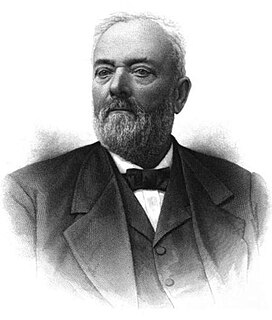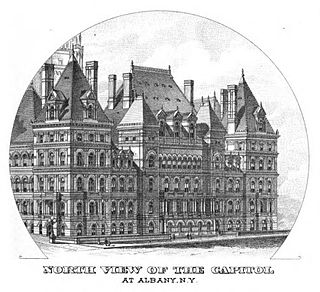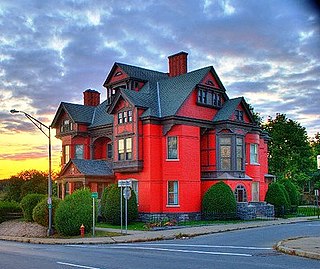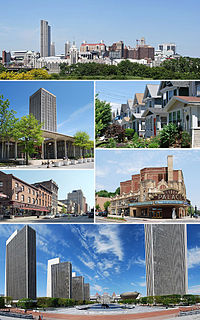Life
He first learned the printer's trade, but in 1854 went to Albany and began to work for the Merchants' National Bank with which he remained until the day of his death, having become Cashier in 1864 and Vice President in 1880.
In 1872, he was elected Treasurer of Albany County. In 1876, he was a presidential elector. He was New York State Treasurer from 1880 to 1881, elected in 1879. He was an alternate delegate to the 1884 Republican National Convention.
The New York State Treasurer was a state cabinet officer in the State of New York between 1776 and 1926. During the re-organization of the state government under Governor Al Smith, the office was abolished and its responsibilities transferred to the new Department of Audit and Control headed to the New York State Comptroller.

The 1884 Republican National Convention was a presidential nominating convention held at the Exposition Hall in Chicago, Illinois, on June 3–6, 1884. It resulted in the nomination of former House Speaker James G. Blaine from Maine for President and Senator John A. Logan of Illinois for Vice President. The ticket lost in the election of 1884 to Democrats Grover Cleveland and Thomas A. Hendricks.
At a time, he was one of the co-owners of the Albany Morning Express newspaper.
He was the receiver of the Universal Life Insurance Company of New York City.
In law, receivership is a situation in which an institution or enterprise is held by a receiver—a person "placed in the custodial responsibility for the property of others, including tangible and intangible assets and rights"—especially in cases where a company cannot meet financial obligations or enters bankruptcy. The receivership remedy is an equitable remedy that emerged in the English chancery courts, where receivers were appointed to protect real property. Receiverships are also a remedy of last resort in litigation involving the conduct of executive agencies that fail to comply with constitutional or statutory obligations to populations that rely on those agencies for their basic human rights.

The City of New York, usually called either New York City (NYC) or simply New York (NY), is the most populous city in the United States. With an estimated 2017 population of 8,622,698 distributed over a land area of about 302.6 square miles (784 km2), New York is also the most densely populated major city in the United States. Located at the southern tip of the state of New York, the city is the center of the New York metropolitan area, the largest metropolitan area in the world by urban landmass and one of the world's most populous megacities, with an estimated 20,320,876 people in its 2017 Metropolitan Statistical Area and 23,876,155 residents in its Combined Statistical Area. A global power city, New York City has been described as the cultural, financial, and media capital of the world, and exerts a significant impact upon commerce, entertainment, research, technology, education, politics, tourism, art, fashion, and sports. The city's fast pace has inspired the term New York minute. Home to the headquarters of the United Nations, New York is an important center for international diplomacy.

David Wilber was a United States Representative from New York.

The 1900 New York state election was held on November 6, 1900, to elect the Governor, the Lieutenant Governor, the Secretary of State, the State Comptroller, the Attorney General, the State Treasurer and the State Engineer, as well as all members of the New York State Assembly and the New York State Senate.

The 1896 New York state election was held on November 3, 1896, to elect the Governor, the Lieutenant Governor and a judge of the New York Court of Appeals, as well as all members of the New York State Assembly. Besides, a constitutional amendment on forestry was proposed, and rejected with 321,486 votes for and 710,505 against it.

Frederic Pepoon Olcott was an American banker and politician.
Stephen Clark was an American politician who served as the 23rd Treasurer of New York State.
James Mackin was an American merchant, banker and politician.

James Lee Wells was an American businessman and politician. He became known as Father of The Bronx which title was officially conferred on him by the Bronx Board of Trade in May 1921.
John C. Jacobs was an American politician from New York.

The 1881 New York state election was held on November 8, 1881, to elect the Secretary of State, the State Comptroller, the Attorney General, the State Treasurer, the State Engineer and a judge of the New York Court of Appeals, as well as all members of the New York State Assembly and the New York State Senate.

The 1883 New York state election was held on November 6, 1883, to elect the Secretary of State, the State Comptroller, the Attorney General, the State Treasurer and the State Engineer, as well as all members of the New York State Assembly and the New York State Senate. Besides, a constitutional amendment to abolish contract labor from the state prisons was proposed and accepted with 498,402 votes for and 269,377 against.
Isaac Horton Maynard was an American lawyer and politician from New York.

The 1886 New York state election was held on November 2, 1886, to elect a judge of the New York Court of Appeals, as well as all members of the New York State Assembly.

The 1889 New York state election was held on November 5, 1889, to elect the Secretary of State, the State Comptroller, the Attorney General, the State Treasurer, the State Engineer and a judge of the New York Court of Appeals, as well as all members of the New York State Assembly and the New York State Senate.

The 1893 New York state election was held on November 7, 1893, to elect the Secretary of State, the State Comptroller, the Attorney General, the State Treasurer, the State Engineer and a judge of the New York Court of Appeals, as well as all members of the New York State Assembly and the New York State Senate, and delegates to the New York State Constitutional Convention of 1894.

The 1895 New York state election was held on November 5, 1895, to elect the Secretary of State, the State Comptroller, the Attorney General, the State Treasurer, the State Engineer and a judge of the New York Court of Appeals, as well as all members of the New York State Assembly and the New York State Senate. Besides, the voters were asked if they approved of the State's issuing bonds for $9,000,000.00 to spend on canal improvements, which the electorate answered in the affirmative.
The 1873 United States Senate election in New York was held on January 21, 1873, by the New York State Legislature to elect a U.S. Senator to represent the State of New York in the United States Senate.
The 1879 United States Senate election in New York was held on January 21, 1879, by the New York State Legislature to elect a U.S. Senator to represent the State of New York in the United States Senate.
The 1881 United States Senate election in New York was held on January 18, 1881, by the New York State Legislature to elect a U.S. Senator to represent the State of New York in the United States Senate.
The United States Senate elections of 1880 and 1881 were elections that coincided with the presidential election of 1880, and had the Democratic Party lose five seats in the United States Senate. The newly elected Readjuster senator caucused with the Republicans, and the Republican Vice President's tie-breaking vote gave the Republicans the slightest majority. All of that changed September 19, 1881 when the Vice President ascended to the Presidency and the Senate became evenly-divided.

The 102nd New York State Legislature, consisting of the New York State Senate and the New York State Assembly, met from January 7 to May 22, 1879, during the third year of Lucius Robinson's governorship, in Albany.









